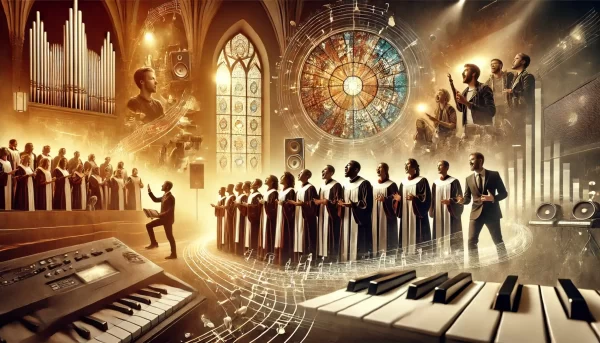Gospel music, with its roots deeply planted in African American spirituals, hymns, and folk songs, has not only stood the test of time but has also profoundly influenced a wide range of musical genres.
From rock to R&B, soul to pop, and even hip-hop, the fingerprints of gospel are found throughout the musical world. But how exactly has this spiritual genre become such a foundational pillar in modern music?
The Origins of Gospel Music
Gospel music originated in the early 20th century, particularly in African American churches across the southern United States.
It emerged as a form of worship and expression of faith, heavily rooted in Christian beliefs and the struggles of the Black community during slavery and segregation.
Characterized by powerful vocals, call-and-response singing, rich harmonies, and deeply emotional delivery, gospel music became a spiritual outlet and a cultural force that extended beyond religious gatherings.
Influence on Soul and R&B
The most direct influence of gospel can be heard in soul and R&B music. Icons like Aretha Franklin, who started singing in church choirs, carried gospel’s emotion and vocal power into the mainstream.
Artists like Ray Charles and Sam Cooke transitioned from gospel to secular music, bringing gospel’s passionate style to wider audiences.
The emotional depth, improvisational vocal runs, and choir-style arrangements commonly found in soul and R&B are all hallmarks of gospel tradition.
The way these genres touch listeners emotionally is a direct inheritance from the church.
Gospel’s Role in the Birth of Rock ‘n’ Roll
You can’t talk about the birth of rock ‘n’ roll without mentioning gospel. Artists like Elvis Presley, Little Richard, and Jerry Lee Lewis all had strong gospel influences.
Elvis, in particular, often cited gospel as his favorite genre and included gospel tracks in his albums.
Gospel’s upbeat rhythms, hand-clapping patterns, and passionate vocalizations formed the backbone of early rock ‘n’ roll.
The energy and raw emotion of gospel helped shape rock into the expressive and rebellious genre it became.
Gospel Elements in Pop Music
Even pop music hasn’t been immune to gospel’s touch. Many pop hits have used gospel-inspired backing vocals, choir segments, and harmonic layering to add emotional punch and grandeur.
Think of Madonna’s “Like a Prayer”, Beyoncé’s live performances, or Adele’s vocal styling—all carry echoes of gospel influence.
The use of choirs in pop ballads and dramatic builds in the music structure are techniques lifted directly from gospel traditions, used to create a feeling of intensity and uplift.
Gospel in Hip-Hop and Rap
While at first glance gospel and hip-hop may seem worlds apart, they share more in common than one might think.
Both are deeply rooted in storytelling, cultural identity, and the expression of real-life struggles and victories.
Many hip-hop artists, including Kanye West, Chance the Rapper, and Kendrick Lamar, have incorporated gospel music and themes into their work.
Kanye’s “Jesus Is King” album is almost entirely gospel-driven, while Chance’s “Coloring Book” heavily features gospel choirs and spiritual themes.
This fusion has created a unique subgenre known as gospel rap, which blends hard-hitting beats with uplifting, faith-based lyrics.
The Power of the Gospel Choir
One of the most powerful exports of gospel music is the choir. Gospel choirs, with their dynamic harmonies and synchronized energy, have been featured in film scores, award show performances, commercials, and international tours.
The sheer emotional power of a gospel choir can elevate a performance to something almost transcendental. Artists often bring in choirs for that exact reason—to connect with audiences on a deeper, more spiritual level.
Global Reach and Cultural Impact
Gospel music has traveled far beyond American borders. In countries like South Africa, Nigeria, Brazil, and the UK, gospel has blended with local musical traditions to create vibrant new styles.
In fact, many international artists cite gospel as a core influence on their sound and career.
This global influence showcases gospel’s ability to cross language, culture, and genre—uniting people through its message of hope, perseverance, and faith.
Gospel’s Legacy: A Foundation for Expression
What sets gospel apart—and what allows it to influence so many genres—is its authenticity. Gospel is raw, emotional, and deeply personal.
It taps into something universal: the human desire to connect with something greater, to express pain and joy, and to find purpose through music.
Whether sung in a small-town church or blasted from global stages, gospel’s spirit lives on in nearly every genre we hear today.
It has given artists the tools to be vulnerable, to inspire, and to move crowds—not just with sound, but with soul.
A Genre That Keeps Giving
Even as music continues to evolve, gospel remains a wellspring of inspiration. It’s more than just a genre—it’s a spiritual force, a cultural monument, and a musical foundation.
Gospel has shaped how we sing, how we feel music, and how we tell our stories through song.
As long as music exists to express the human spirit, gospel’s influence will never fade.

